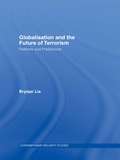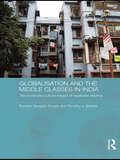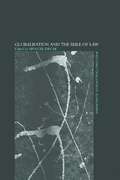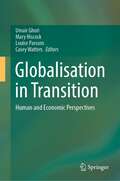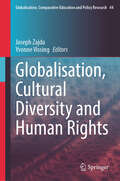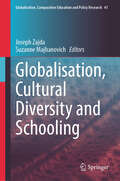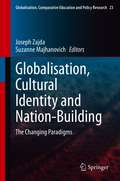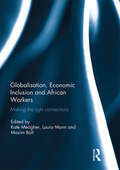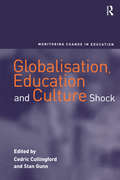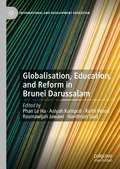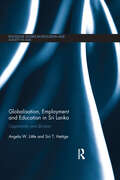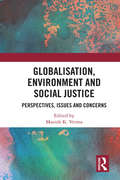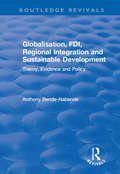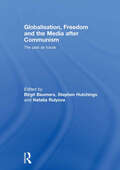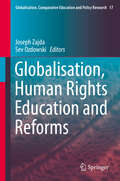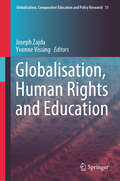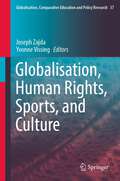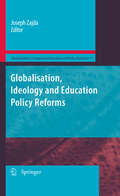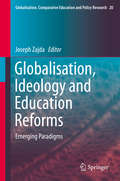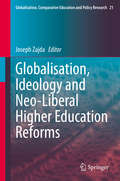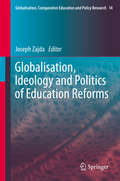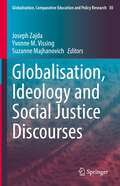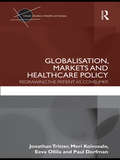- Table View
- List View
Globalisation and the Future of Terrorism: Patterns and Predictions (Contemporary Security Studies)
by Brynjar LiaThis new study is devoted to understanding how international terrorism is shaped, how it evolves and what we can expect in the future. Drawing upon research and methods outside the traditional focus, and by taking both a theoretical approach and a new practical predictive perspective, it delivers a fresh and fascinating contribution to terrorism studies. While predicting terrorism is a highly speculative business, there are ways of identifying certain long-term causes, driving forces and their links with society. Terrorists are usually integral players in local and sometimes global politics. Hence, when the local, regional and international contexts change, so does terrorism. Thoroughly reviewing the body of literature on the causes of terrorism, this study also combines predictive and futuristic analyses on globalisation, supported by a range of key case studies. It spans from the transformation of international relations, the globalisation of the market economy, demographic factors, ideological shifts and technological changes. The result is a set of key conclusions about the future patterns of terrorism, which are not simply best guesses, but also backed up by solid research. This book will be of great interest to all students and scholars of terrorism, globalisation, politics and international relations.
Globalisation and the Middle Classes in India: The Social and Cultural Impact of Neoliberal Reforms (Routledge Contemporary South Asia Series)
by Ruchira Ganguly-Scrase Timothy J. ScraseThis book fills an important gap in the existing literature on economic liberalization and globalisation in India by providing much needed ethnographic data from those affected by neoliberal globalisation. Based on ethnographic fieldwork and interviews, it reveals the complexity of the globalisation process and describes and accounts for the contradictory attitudes of the lower middle classes. The authors challenge the notion of a homogeneous Indian middle class as being the undoubted beneficiaries of recent neoliberal economic reforms, showing that while the lower middle classes are generally supportive of the recent economic reforms, they remain doubtful about the long term benefits of the country's New Economic Policy and liberalisation. Significantly, this book discusses and analyzes both the economic and cultural sides to globalisation in India, providing much-needed data in relation to several dimensions including the changing costs of living; household expenditure, debt and consumerism; employment and workplace restructuring; gender relations and girls’ education; global media and satellite television; and the significance of English in a globalising India. Globalisation and the Middle Classes in India will be of interest to scholars and students working in the fields of Sociology, Social Anthropology and Development Studies, as well as Asian Studies - in particular studies of South Asia and India - and Globalisation Studies.
Globalisation and the Roman World
by Martin Pitts Miguel John VersluysThis book explores a new perspective for understanding the Roman world, using connectivity as a major point of departure. Globalisation is apparent in increased flows of objects, people and ideas and in the creation of translocal consciousness in everyday life. Based on these criteria, there is a case for globalisation in the ancient Roman world. Essential for anyone interested in Romanisation, this volume provides the first sustained critical exploration of globalisation theories in Roman archaeology and history. It is written by an international group of scholars who address a broad range of subjects, including Roman imperialism, economics, consumption, urbanism, migration, visual culture and heritage. The contributors explore the implications of understanding material culture in an interconnected Roman world, highlighting several novel directions for future research.
Globalisation and the Rule of Law (Challenges of Globalisation)
by Spencer ZifcakGlobalisation and the Rule of Law reassesses the idea of the 'rule of law' within the present complex and increasingly internationalized environment. There have been many books studying the phenomenon of globalization and its economic, social or cultural consequences. This book, however, is the first to relate globalization exclusively to law. It examines the impact of globalization upon the rule of law, a fundamental value within liberal democratic sovereign states. The book opens with three chapters discussing the theory of the rule of law and its necessary reconceptualization in a global environment. Then, in three sections considering global trade, security and human rights, it proposes new ways of thinking about global law and its application in new and existing institutions of global governance. Contributors include top-flight academics, politicians and judges, making this book significant and relevant in both jurisprudential theory and political practice.
Globalisation in Transition: Human and Economic Perspectives
by Mary Hiscock Umair Ghori Louise Parsons Casey WattersThis book brings together diverse ideas on selected facets of globalisation and transitions in globalisation. The scholars that have contributed to this book examine the phenomenon of globalisation through varied lenses, focusing specifically on the human and economic perspectives. These analyses originate in many areas and different legal systems but are all connected through the work of Professor John Farrar and the associations of the contributors with him. This book does not attempt to provide answers to the many challenges of globalisation. Instead, this book discusses selected, particular aspects of globalisation that derive from and are connected to the authors’ own research. The thematic diversity of this book is a true strength and should draw a broad range of readers. Whilst this book is primarily written from a legal angle, its content overlaps with broader specialised policy areas, with contributions ranging from taxation to ageing, from insolvency to social licences, and from refugees to the treatment of first nations people. In short, there is something for everyone in this book. As a tribute to the life’s work of an outstanding legal scholar, Professor John Farrar, this book explores legal responses to the social and economic impacts of globalisation. After personal acknowledgments from colleagues highlighting the significance of his scholarship, this book is divided into two parts. The first part addresses the social impact of globalisation, focusing on immigration and the impact on First Nations people. Changes in the regulation of medicine and technologies related to ageing are also addressed in this part. In part two, the book addresses the transitioning corporate law landscape and notions of fairness and good faith in the law. The final part contains the conclusions, reflections and synthesis of the editors.
Globalisation, Cultural Diversity and Human Rights (Globalisation, Comparative Education and Policy Research #44)
by Joseph Zajda Yvonne VissingThis book analyses major discourses of cultural diversity and human rights. The chapters contained in this book examine critically major issues confronting cultural diversity and human rights, both locally and globally. They analyze the challenges that different societies are confronted with, as they attempt to implement, protect and defend cultural diversity and human rights in an ever-changing world, and culturally diverse environment. Topics covered include celebrating cultural diversity in sport, human rights legacies of the African slave trade and the long-term implications of colonialism, assessment of human rights and sports, effectiveness in intercultural dialogue in dominant discourses of cultural diversity and human rights, and the rising importance of cultural diversity and human rights in sport for children and youth.This book will be helpful to readers to explore their own views and consider more broadly what may be in the best interests of a fair and just society, as envisioned in human rights treaties, human rights education in schools, and cultural diversity.
Globalisation, Cultural Diversity and Schooling (Globalisation, Comparative Education and Policy Research #41)
by Joseph Zajda Suzanne MajhanovichThis book analyses dominant discourses of globalisation, cultural diversity and schooling. The collection in this volume advance further the discussions on the phenomenon of globalisation, and its far-reaching effects on our world, and consider cultural diversity in its broadest sense, as it manifests itself in a globalised world. Zajda has argued that globalisation represents a synthesis of technology, ideology and organisation, specifically related to border crossings of people, global finance and trade, IT convergence as well as cross-cultural communication. The reality of cultural diversity has been brought into stronger focus because of globalisation. Cultural diversity, always present in society is more evident today because of globalisation. The ways society copes with cultural diversity have changed such that the embrace of cultural diversity as part of identity is encouraged in liberal democracies. Cultural diversity, as presented in this volume is seen in a broad contextand includes factors such as race, ethnicity, gender, sexual orientations, socio-economic status, culture, age, and physical ability as well as a variety of beliefs and values. The book contributes in a very scholarly way, to a more holistic understanding of the nexus between globalisation, cultural diversity, democracy, and equality for all.
Globalisation, Cultural Identity and Nation-Building: The Changing Paradigms (Globalisation, Comparative Education and Policy Research #23)
by Joseph Zajda Suzanne MajhanovichThis book critiques dominant discourses and debates pertaining to cultural identity, set against the current backdrop of growing social stratification and unequal access to quality education. It addresses current discourses concerning globalisation, ideologies and the state, as well as approaches to constructing national, ethnic and religious identities in the global culture. It explores the ambivalent and problematic connections between the state, globalisation, the construction of cultural identity, and the nation-building process – also in connection with history education and the history textbooks used in schools. The book also explores conceptual frameworks and methodological approaches applicable to research on the state, globalisation, nation-building and identity politics. Drawing on diverse paradigms, ranging from critical theory to globalisation, the book, by focusing on globalisation, ideology and cultural identity, critically examines recent research in history education and its impact of identity politics, as well as the most significant dimensions defining and contextualising the processes surrounding nation-building and identity politics globally. Given the need for a multiple perspective approach, the authors, who have diverse backgrounds and hail from different countries and regions, offer a wealth of insights, contributing to a more holistic understanding of the nexus between the nation-state and national identity.
Globalisation, Democratisation and Radicalisation in the Arab World
by Jane Harrigan Hamed El-SaidThis unique volume brings together three key themes, globalization, democratization and radicalization in the Arab world. The contributions provide a fascinating analysis of the external and internal linkages that have for decades impeded economic and political reforms in the region. The volumebeginsfrom the premise that globalisation, by failing to deliver the promised benefits of improved economic welfare and individual freedom, dignity and democratisation, has created conditions conducive to violence. The failure of globalisation is linked to the failure of democratisation in a unique approach that traces changes in US foreign policy and democratic rhetoric in the region since 9/11. The third and final part of the book reveals how the weak capacity of the nation state, its failure to modernise and manage sustainable growth rates, reduce poverty and inequities, as well as its failure to manage political reform, the democratisation process and relations with ethnic minorities have all combined to create a specific and dangerous type of extremism that led and is leading to terrorism. The book provides a new and coherent framework that enables policy makers and practitioners to better understand, identify and deal with the root causes of terrorism. The book ends up with a comprehensive analysis for de-radicalisation programs in more than 30 countries from all regions of the globe, providing the largest known inventory of de-radicalisation policies in the world. This book is indispensable reading for all interested in political economy, development economics and Middle Eastern politics. "
Globalisation, Economic Inclusion and African Workers: Making the Right Connections
by Maxim Bolt Kate Meagher Laura MannThis book addresses the question of whether greater inclusion in the global economy offers a solution to rising unemployment and poverty in contemporary Africa. The authors trace the connection between global demographic change and new mechanisms of economic inclusion via global value chains, digital networks, labour migration, and corporate engagement with the bottom of the pyramid, challenging the claim that African workers have become functionally irrelevant to the global economy. They expose the shift of global demand for African workers from formal to increasingly informalised labour arrangements, mediated by social enterprises, labour brokers, graduate entrepreneurs and grassroots associations. Focusing on global employment connections initiated from above and from below, the authors examine whether global labour linkages increase or reduce problems of vulnerable and unstable working conditions within African countries, and considers the economic and political conditions needed for African workers to capture the gains of inclusion in the global economy. This book was previously published as a special issue of the Journal of Development Studies.
Globalisation, Education and Culture Shock (Monitoring Change in Education)
by Stan GunnHow has globalisation affected educational thought and practice? This volume presents a fascinating exploration of the impact of globalisation on education. The authors consider the changes - sometimes subtle, sometimes revolutionary - that arise when ideas, practices and experiences are discussed and analysed by people of contrasting cultural backgrounds. Through a series of case studies, they examine the dilemmas and contradictions, as well as the new ideas and opportunities, that globalisation offers to individuals, to states and to intellectual cultures. Key areas of discussion include: ¢ The effects of globalisation on individuals ¢ The contradictions embedded in the process of globalisation - especially in the economic sphere ¢ The impact on education of globalising ideas, thoughts and values ¢ The relationship between globalisation and culture.
Globalisation, Education, and Reform in Brunei Darussalam (International and Development Education)
by Le Ha Phan Keith Wood Asiyah Kumpoh Rosmawijah Jawawi Hardimah SaidThis book focuses on the intertwined relationships between globalisation, nation-building, education, and reform as manifested throughout the modern history of Brunei Darussalam, an Islamic monarchy located on the island of Borneo in Southeast Asia. It is the first book dedicated to the examination of Brunei’s education system, schooling, teacher education, and society in close connection with the national philosophy Melayu Islam Beraja (MIB) or Malay Islamic Monarchy. The authors provide a historical understanding of the country’s education and tell Brunei’s story of educational reform and change in its own language, narratives, accounts, and unique standpoints. Interdisciplinary chapters draw on significant historical and textual sources in three languages, namely Arabic, English, and Malay, to contribute to scholarship on education studies, international and comparative education, and international and development education.
Globalisation, Employment and Education in Sri Lanka: Opportunity and Division (Routledge Studies in Education and Society in Asia)
by Angela W. Little Siri T. HettigeSince the late 1970s, Sri Lanka has undergone a socio-economic transformation, from protectionism towards economic liberalisation and increasing integration into the world economy. Through a systematic comparison of these periods of economic change (1956–1977, and 1977 to the present), Angela W. Little and Siri T. Hettige examine the impact of this transformation on education, youth employment and equality of opportunity in Sri Lanka. The book charts Sri Lanka’s shift from a predominantly agricultural economy to one dominated by services and manufacturing, a reduction in unemployment, rising educational and occupational levels, expectations and achievements, and a reduction in poverty. In turn, it reveals a growing role for the private sector and foreign interests in post-secondary education and a modest growth in private education at the primary and secondary levels, as well as widening social disparities in access to qualifications, training and skills. The Sri Lankan experience of, and engagement with, globalisation has been tempered by a long-running ethnic conflict that hindered economic and social development and diverted considerable public funds into defence and war. Now that the war is ‘won’, the challenge is how to invest in human resource development and the fulfilment of the expectations of youth from all ethnic and social groups. This challenge requires serious policy analysis, the generation of more state revenues, the reallocation of existing public resources, and a political commitment to the winning of a sustainable peace and stability. This book makes an important contribution to the broader international literature on the implications of globalisation for education policy and practice, and to the interaction of exogenous and endogenous forces for educational change. It deals with the tension between the high social demand for education and the growing demand for specialised skills in a changing economy. As such, it has a wide interdisciplinary appeal across education policy and politics, Asian education, South Asian society, youth policy, sociology of education, political economy of social change, and globalisation.
Globalisation, Environment and Social Justice: Perspectives, Issues and Concerns
by Manish K. VermaThis volume provides a comprehensive account of the connections between globalisation, environment and social justice. It examines varied dimensions of environmental sustainability; the adverse impact of globalisation on environment and its consequences for poverty, unemployment and displacement; the impacts on marginalised sections such as scheduled castes and tribes and women; and policy frameworks for ensuring environmental sustainability and social justice. The chapters build on detailed case studies from different parts of the world and deal with critical environmental issues such as global emissions, climate change, sustainable development, green politics, species protection, water governance, waste management, food production and governance besides education, inclusivity and human rights. Presenting a range of topics alongside new perspectives and discourses, this interdisciplinary book will be useful to students and researchers of political studies, sociology and environmental studies as well as policymakers and those working in the government and civil society organisations.
Globalisation, FDI, Regional Integration and Sustainable Development: Theory, Evidence and Policy (Routledge Revivals)
by Anthony Bende-NabendeThis title was first published in 2002: Anthony Bende-Nabende focuses on the ongoing globalization process, which has sparked an unprecedented world-wide debate. He provides a one-stop centre for a balanced coverage of the theoretical, empirical and policy issues linking globalization with foreign direct investment, regional economic integration, and economic growth and sustainable development. This stimulating book comprehensively explores the theoretical and empirical literature inter-linking the aforementioned factors from the anti-globalization activists’ viewpoint, and from the pro-globalization proponents’ perspective. It proposes policies that individual countries should pursue, based on the recognition that globalization generates both positive and negative effects. These comprise policies required to maximise the economic benefits globalization may generate, and those that aim to eliminate or at least minimize the negative development-oriented effects globalization may engender and, hence, to propel sustainable development. The book will be an essential guide for students, academics and those involved in international economics, environmental studies, international relations, and growth and development studies.
Globalisation, Freedom and the Media after Communism: The Past as Future (Routledge Europe-Asia Studies)
by Stephen Hutchings Birgit Beumers Natalia RulyovaThis book examines the fate of post-Soviet press freedom and media culture in the context of the growing impact of globalisation. To understand the complicated situation that has arisen with respect to these issues in post-Soviet space is impossible without collaboration between political scientists, sociologists, cultural analysts, media studies researchers and media practitioners. The book is one of the first attempts to bridge the gaps between political and cultural studies approaches, between textual analysis and audience research, as well as between practitioner-led and scholarly approaches to the post-Soviet media The cumulative impact of the essays contained in this section is to reinforce the intuition which inspired it: that the post-Soviet media remain a highly heterogeneous, complex and dynamic field for investigation. With contributions from scholars and journalists across Europe (including the former Soviet Union), the collection addresses such issues as censorship and elections, the legacy of the Soviet past, terrorism and the media, the post-Soviet business press, advertising and nation building, official press discourse and entrepreneurship, and global formats on Russian television.This book was originally published as a special issue of Europe-Asia Studies.
Globalisation, Human Rights Education and Reforms
by Joseph Zajda Sev OzdowskiThis book, the seventeenth instalment in the 24-volume series Globalisation, Comparative Education and Policy Research, explores the interrelationship between ideology, the state and human rights education reforms, setting it in a global context. The book examines major human rights education reforms and policy issues in a global culture. It focuses on the ambivalent and problematic relationship between the state, globalisation and human rights education discourses. Using a number of diverse paradigms, ranging from critical theory to historical-comparative research, the authors examine the reasons for, and the outcomes of human rights education reforms and policy. The authors discuss discourses surrounding the major dimensions affecting the human rights education, namely national identity, democracy, and ideology. These dimensions are among the most critical and significant dimensions defining and contextualising the processes surrounding the nation-building, identity politics and human rights education globally. With this as its focus, the chapters represent hand-picked scholarly research on major discourses in the field of human rights education reforms. The book draws upon recent studies in the areas of globalisation, equality, and the role of the state in human rights education reforms. Furthermore, the perception of globalisation as dynamic and multi-faceted processes clearly necessitates a multiple-perspective approach in the study of human rights education. This book provides that perspective commendably. It also critiques current human rights education practices and policy reforms. It illustrates the way shifts in the relationship between the state and human rights education policy. In the book, the authors, who come from diverse backgrounds and regions, attempt insightfully to provide a worldview of current developments in research concerning human rights education, and citizenship education globally. The book contributes, in a very scholarly way, to a more holistic understanding of the nexus between nation-state, human rights education both locally and globally.
Globalisation, Human Rights and Education (Globalisation, Comparative Education and Policy Research #51)
by Joseph Zajda Yvonne VissingThis book analyses major discourses of human rights and education. It examines critically major issues confronting human rights and education, both locally and globally. The various chapters analyze the challenges that different societies are faced with, as they attempt to implement, protect and defend democracy, cultural diversity and human rights in schools. The book helps readers to explore their own views and consider more broadly what may be in the best interests of a fair and just society, as envisioned in human rights treaties, human rights education in schools, and cultural diversity.
Globalisation, Human Rights, Sports, and Culture (Globalisation, Comparative Education and Policy Research #37)
by Joseph Zajda Yvonne VissingThis book offers research findings of the different types of human rights issues that concern athletes and sports programs and the issue of how organizations are addressing safety and human rights issues. The study of sports has not typically been considered as a human rights field. In recent years it is clear that athletes have experienced a variety of human rights violations. As a result, many sports programs have been confronted with criminal violations of abuse and maltreatment. Some sports organizations are developing athlete bills of rights in response. The book provides readers with an overview of the importance of human rights policies and practices in sports, and a synthesis of where the field of sport human rights could be developed. The chapters explores human rights in sports from both organizational and interpersonal approaches. There are both organizational and individual factors associated with human rights. There can be rights violations by coaches, trainers, doctors, or even other athletes. Violations can be physical, sexual, emotional, social, or financial. Organizational policies vary from being very equitable and rights-respecting to those that put athletes at risk or discriminate against them. This book is the first of its kind that links together sports and human rights in a systematic way.
Globalisation, Ideology and Education Policy Reforms
by Joseph ZajdaThe eleventh in the 12-volume book series Globalisation, Comparative Education and Policy Research, this work sets out to explore the interrelationship between ideology and education reforms, setting it in a global context. With this as its focus, the chapters represent hand-picked scholarly research on major discourses in the field of comparative education. A compendium of the very latest thinking on the subject, this volume is, like the others in the series, a state-of-the-art sourcebook for researchers, practitioners and policymakers alike. Not only do the chapters offer a timely overview of current issues affecting comparative education and education policy research in what is now a global educational culture, but the work also contains ideas about future directions that policy reforms could take. The book draws upon recent studies in the areas of globalisation, equity, and the role of the State. It explores conceptual frameworks and methodological approaches applicable in the research covering the State, globalisation, and education reforms. The research evinces the neo-liberal ideological imperatives of current education and policy reforms, and illustrates the way that shifts in the relationship between the State and education policy affect current trends in education reforms and schooling globally. Individual chapters critically assess the dominant discourses and debates on comparative education research in education and policy reforms. Using diverse comparative education paradigms from critical theory to globalisation, the authors focus on globalisation, ideology and democracy and examine both the reasons and outcomes of education reforms, policy change and transformation. They provide a more informed critique of models of accountability, quality and school effectiveness that are informed by Western social values. The book also draws upon recent studies in the areas of equity, cultural capital and dominant ideologies in education.
Globalisation, Ideology and Education Reforms: Emerging Paradigms (Globalisation, Comparative Education and Policy Research #20)
by Joseph ZajdaThis book analyses the nexus between ideology, the state, and education reforms worldwide. The research evinces the neo-liberal ideological imperatives of current education and policy reforms and illustrates the way these shifts in the relationship between the state and education policy are affecting current trends in education reforms and schooling around the globe. With this as its focus, the chapters represent hand-picked scholarly research on major discourses in the field of global education reforms. Offering a compendium of the very latest thought on the subject, this book is, like the others in the series, a state-of-the-art sourcebook for researchers, practitioners and policymakers alike. Not only do the chapters offer a timely analysis of current issues shaping education policy research; the work also contains ideas about future directions that education and policy reforms could take. By doing so, it provides a comprehensive view of the diverse and intersecting discourses on globalisation and policy-driven reforms in education.The book draws on recent studies in the areas of globalisation, education reforms, and the role of the state. Respective chapters critically assess the dominant discourses and debates on education and policy reforms. Using diverse comparative education paradigms, ranging from critical theory to historical-comparative research, they focus on globalisation, ideology and democracy, and examine both the reasons for and outcomes of education reforms and policy change.
Globalisation, Ideology and Neo-Liberal Higher Education Reforms (Globalisation, Comparative Education and Policy Research #21)
by Joseph ZajdaThis book sets out to examine the neo-liberal dimensions of globalisation and market-driven economic imperatives that have impacted higher education reforms. It critiques the notions of accountability, efficiency, academic capitalism, quality of education, and the market-oriented and entrepreneurial university model, based on a neo-liberal ideology. The expansion of economic rationality into the educational sector is one the most ubiquitous dimensions of neo-liberalism and one of its most powerful ideological tools, resulting in the commodification, commercialization, and marketization of education and knowledge. The book critiques structural changes in education and the impact of neo-liberalism and globalisation on educational systems around the world. With this as its overall focus, the respective chapters present hand-picked scholarly research on major discourses in the field of global neo-liberal education reforms. The book draws upon recent studies in the areas of globalisation, neo-liberal education reforms, and the role of the state. It critically assesses the neo-liberal ideological imperatives of current education and policy reforms and illustrates how these shifts in the relationship between the state and education policy are shaping current trends in education policy reform outcomes. Taken together, the chapters offer a timely analysis of current issues affecting neo-liberal education policy research, and outline future directions that education and policy reforms could take.
Globalisation, Ideology and Politics of Education Reforms
by Joseph ZajdaThis 14th volume in the 24-volume book series sets out to explore the interrelationship between ideology, the state, and education reforms, placing it in a global context. It examines some of the major education reforms and policy issues in a global culture, particularly in the light of recent shifts in accountability, quality and standards-driven education, and policy research. By doing so, it provides a comprehensive picture of the intersecting and diverse discourses of globalisation and policy-driven reforms in education. The book draws upon recent studies in the areas of globalisation, equality, and the role of the state. It explores conceptual frameworks and methodological approaches applicable in the research covering the state, globalisation, and education reforms. It critiques the neo-liberal ideological imperatives of current education and policy reforms, and illustrates the way that shifts in the relationship between the state and education policy affect current trends in education reforms and schooling globally. Individual chapters critically assess the dominant discourses and debates on education and policy reforms. Using diverse comparative education paradigms from critical theory to historical-comparative research, the chapters focus on globalisation, ideology and democracy and examine both the reasons and outcomes of education reforms and policy change. They provide an informed critique of models of accountability, quality and standards-driven education reforms that are informed by Western dominant ideologies and social values. The book also draws upon recent studies in the areas of equity, cultural capital and dominant ideologies in education.
Globalisation, Ideology and Social Justice Discourses (Globalisation, Comparative Education and Policy Research #30)
by Joseph Zajda Suzanne Majhanovich Yvonne M. VissingThis book examines dominant discourses in social justice education globally. It presents cutting-edge research on the major global trends in education, social justice and policy research. Using diverse paradigms, ranging from critical theory to discourse analysis, the book examines major social justice and equity education reforms and policy issues in a global culture, with a focus on the ambivalent and problematic relationship between social justice education discourses, ideology and the state. The book discusses democracy, ideology and social justice, which are among the most critical and significant factors defining and contextualising the processes surrounding social justice education reforms globally. It critiques current social justice education practices and policy reforms, illustrating the shifts in the relationship between the state, ideology, and social justice education policy.Written by authors from diverse backgrounds and regions, this book examines current developments in research concerning social justice education. It enables readers to gain a more holistic understanding of the nexus between social justice education, and dominant ideologies, both locally and globally. It also provides an easily accessible, practical, yet scholarly insights into local and global trends in the field of social justice education. Discourses of Globalization, Ideology and Social Justice, with contributions from key scholars worldwide, should be required reading for a broad spectrum of users, including policy-makers, academics, graduate students, education policy researchers, administrators, and practitioners.
Globalisation, Markets and Healthcare Policy: Redrawing the Patient as Consumer (Critical Studies in Health and Society)
by Jonathan Tritter Meri Koivusalo Eeva Ollila Paul DorfmanAlthough the last two decades have seen the healthcare systems of most developed countries face pressure for major reform, the impact of this reform on the relationship between empowerment, consumerism and citizen’s rights has received limited research attention. Globalisation, Markets and Healthcare Policy sets out to redress this imbalance. This book explores the extent to which globalisation and commercialisation relate to current and emerging health policies. It also looks at the implications for citizens, patients and social rights, as well as how policy making interacts with the interests of global and European trade and economic policies. Topics discussed include: How the impact of globalisation on health systems is apparent in the influence of international actors and European policies. How the impact of globalisation is mediated by national priorities and policies and is therefore reflected in diverse influences. How commercialisation of health is presented as benefiting citizens and patients but has the potential to undermine the aims and values inherent in health systems. How the role of citizens' interests, social rights, patient’s rights and priorities of patient and public involvement need to be separated from commercialisation, choice and consumerism in health care. Essential reading for policy makers and students of public policy, politics, law and health services, Globalisation, Markets and Healthcare Policy will also appeal to those interested in patient involvement international healthcare, international relations, trans-national organisations and the EU.
